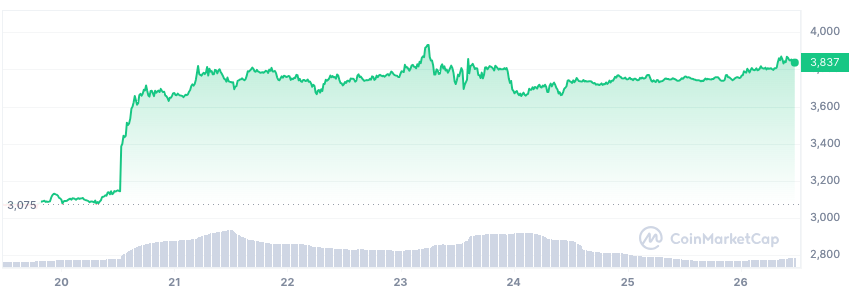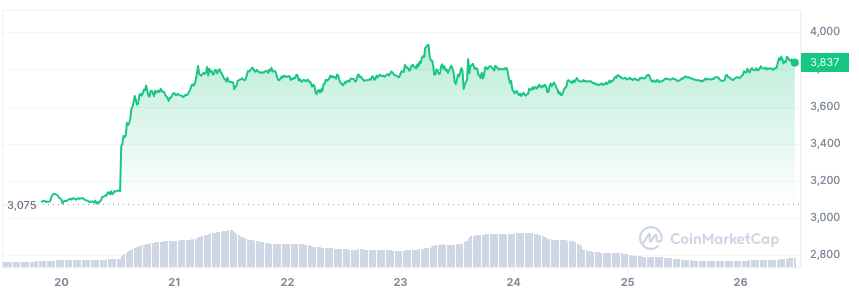Issue 19: The sudden Ethereum ETF
This issue of the newsletter is all about the sudden Ethereum ETF approval, the market's reaction, and what might be coming next.

If you’ve been watching the crypto headlines this past week, you know that a lot has happened in the last seven days.
There’s been so much movement in terms of markets, regulation, policy, politics, etc.
In this issue, we will cover:
- The surprising passage of Ethereum ETFs
- An update on new (and first-of-kind) crypto legislation
- The quick 180 on digital asset policy in the US
Things happen quickly in crypto, and big market moves to the upside or downside are not uncommon, but this past week felt like a major departure from business as usual.
Despite the backdrop of recent news, there is still uncertainty about how the market might behave from here. Some market observers are predicting a surge in price for Ethereum, while others are predicting increased volatility, partly because there might be big sell-offs of ETH once the ETFs do start trading.
It’s also unclear if the approval of the Ethereum ETF clears up all of the uncertainty around ETH’s status as a security (or not) by the SEC and what that might mean for other ETH-based projects, or other layer 1 blockchains.
As you might remember, the SEC was recently on a roll issuing Wells notices to leading crypto companies (Robinhood and Uniswap both received Wells notices in the past few weeks, Coinbase received one in March of 2023) regarding the status of Ethereum-based products.
The Wells notice activity and other regulatory uncertain were creating a lot of drag on the crypto market.
Does any of that still matter?
There’s a lot to catch up on, so let’s dive in!

Ethereum ETF
An ETF or an exchange-traded fund allows investors to access the underlying asset (in the case, of Ethereum) through a traditional stock market brokerage. Bitcoin ETFs were approved earlier this year. I wrote a basic overview of how they work, which is a good place to get up to speed.

The upside of this model is that it is easier for investors to access Ethereum through things like traditional investing or retirement accounts. It also makes it easier for institutional investors to get exposure to digital assets through existing, regulated channels.
The downside is that owning Ethereum (or any crypto) via an ETF is that it puts several intermediaries between the investor and the actual asset. In this model, self-custody is not possible, which waters down one of the main crypto use cases or utilities.
Nevertheless, as we saw with the successful launch of the Bitcoin ETF there is pent-up demand for this kind of investment product. When the Bitcoin ETF launched, the market reception blew away even the most bullish investors.
To give you an idea, these are the eight firms approved to offer ETH ETFs: ARK, Bitwise, BlackRock, Fidelity, Frank Templeton, Invesco Galaxy, and VanEck.
But the craziest part about the Ethereum ETF approval is how it came about.
Not that long ago — as in seven days ago — it felt like the approval of an Ethereum ETF would have to wait until a change in the political climate.
Then suddenly, at the beginning of the week, the SEC asked firms interested in offering an Ethereum ETF to quickly update their filings in advance of a deadline on Thursday, May 23 deadline for the SEC to decide on one of the applications.
Once the news got out, the market responded with a massive uptick in Ethereum’s price, which is now up almost 26% on the 7-day chart at the time of this writing.

By Thursday evening the eight spot ETFs mentioned above were approved. Despite the approval, it’s unclear when an Ethereum ETF will start trading (the SEC still has to approve S-1s for the listing firms).
That means nobody knows when the ETFs will be available to investors. Estimates vary from weeks to months — since firms were all caught off-guard about the prospects of an ETF they are all scrambling to develop the required compliance and infrastructure in place.
Another interesting development is that legal experts are in disagreement about how the approval of the Ethereum ETFs affects ETH’s underlying status. The fuzziness of whether Ethereum is a security or a commodity is one of the main issues that has created so much regulatory uncertainty. So having some kind of official clarification would be welcome by many.
Legislative limbo
If the sudden jolt of excitement and market activity surrounding the Ethereum ETF wasn’t enough, on Wednesday, the House of Representatives also passed the Financial Innovation and Technology for the 21st Century Act, also know as FIT21.
Viewed as the first piece of crypto-specific legislation, the goal of the bill is to clarify the role and jurisdictions of various government regulators like the Commodity Futures Trading Commission (CFTC) and the Securities and Exchange Commission (SEC).
The bill also clarifies new kinds of consumer protections such as disclosures and reporting for firms offering crypto products. There are also some common-sense rules included, such as the need for crypto companies to keep customer funds separate from company funds (this seems obvious now, thanks to the FTX collapse).
Here's a quick recap from the Financial Services Committee:
FIT21 establishes clear and functional federal requirements over digital asset markets. It provides the robust consumer protections and regulatory clarity necessary for the digital asset ecosystem to thrive in the US—cementing American leadership of the global financial system of the future while reinforcing our role as a hub for innovation. SOURCE
So what does this all mean?
Some crypto industry leaders are cheering FIT21 as the beginning of the long-awaited regulatory clarity about crypto. Others in crypto are raising concerns that the rather than inspire innovation, the proposed law will create additional costs and overhead, which will dampen new ideas and new tech.
Maybe the most interesting facet of this legislation so far — and also in a weird turn of events — crypto is turning out to become a bipartisan issue. Both sides of the aisle appear to be re-evaluating their stances on crypto and have pivoted to a “pro-innovation” stance, at least for now.
In addition to the stuff we’ve already covered, there was also a whole bunch of activity related to key crypto leaders, presidential candidates, speeches, soundbites, promises, etc., that will make the coming months interesting from a crypto perspective.
Covering the conversion of politicians and how crypto leaders are becoming increasingly political is a fascinating wrinkle and worthy of much more thinking and clarifying…
For now, let’s just say that this past week will be one to remember. Who knows, maybe someday they’ll maybe even make a movie about it, called something like, “The Day Crypto Went Mainstream.”